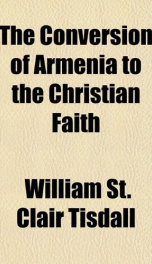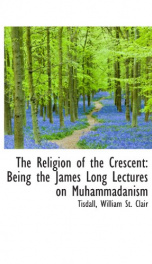the conversion of armenia to the christian faith

Purchase of this book includes free trial access to www.million-books.com where you can read more than a million books for free. This is an OCR edition with typos. Excerpt from book: CHAPTER III MYTHOLOGY OF THE ANCIENT ARMENIANS 'O 0co? 6 1ro1rlaas Rov Koapov Kat Standvro, rti ev avry . . . e1roir]otv re i£ evos 1rav e9vos avBpu1rasv xaro1Ke1v M iravrus 1rpoaui1rov rrjs yijs . . . fontf Rov Qeov, d dpa ye tfrla1p-liae1av avruv 1ctd evpo1iv.Acts xvii. 24-27. While the various tribes which composed the Armenian nation doubtless had each their own favourite deities, many of which had a purely local importance, it may be observed as a general truth that the ancient religion of Armenia, though at one time greatly influenced by Assyrian mythology, was very similar to that of the ancient Persians as preserved for us in the Zend Avesta. Comparison between the Rig-Veda, of India, the Zend Avesta of Persia, the Homeric Poems and Hesiod's Theogony of Greece, and the mythology of the Romans, the Teutons, the ancient Scandinavians and the Norse tribes, shows that, under different names, very much the same deities were worshipped in ancient times by all the nations of the Aryan race. But the chief deities of Armenia, in their names as well as in their attributes, certainly show a very strong Iranic influence ; which, however, had more power to change the names of the deities than to make any very real alteration in the attributes ascribed to them. The chief god of the Armenian mythology %vas styled Aramazd, the same name as that of the Ahura Mazda of the Zend Avesta and of the inscriptions of Darius and Xerxes. But while Ahura Mazda seems to have had no consort and no children, Aramazd was considered as the father of at least all the more important of the Armenian deities. He was the ' Creator of Heaven and Earth,' and was omniscient, the giver of all earthly good things, the bestower of health and wealth, of fullness and abundance. His most common title was '...
Info about the book
Author:
Series:
Unknown
ASIN:
093472816X
Rating:
3/5 (2)Your rating:
0/5
Languge:
English
Users who have this book
Users who want this book
What readers are saying
What do you think? Write your own comment on this book!
write a commentif you like the conversion of armenia to the christian faith try:
Other books by this author
Do you want to exchange books? It’s EASY!
Get registered and find other users who want to give their favourite books to good hands!


